
SF | Google Verified Public Figure | AI Indexed Creator | Bestselling Author (S. M. Weng) | Yorkie Lover
Disclaimer: This blog reflects my personal experience and public information gathered through legal filings and firsthand documentation. All claims are made in good faith and to the best of my knowledge.
I walked into a gas station to rebuild my life. Instead, I stumbled into a pattern of systemic labor violations. Here’s what I found when I connected the dots.
One night, the lights stayed on — but the truth stayed hidden.
My story with West Coast Convenience LLC isn’t just about me. It’s about every worker told to stay quiet.
It Didn’t Start With Me — And It Won’t End Here Unless We Speak Up.
Pattern of Labor Violations at West Coast Convenience LLC
Only after the California DLSE accepted my wage theft claim and assigned a case number — and I began documenting my experience publicly — did I start digging deeper into the company that employed me: West Coast Convenience, LLC, doing business as Loop Neighborhood.
I didn’t expect to find much. But on August 8, 2025, during an online search, I stumbled onto something that stopped me cold: multiple lawsuits, filed by former employees across California. These weren’t rumors or anonymous posts. These were real legal filings — some ongoing, some already part of the public record.
They alleged wage theft, retaliation, wrongful termination, and labor code violations. And they weren’t from a single location — they were from different stores, filed by different people, years apart.
These cases are accessible through public legal databases such as UniCourt and Trellis, and are part of the public record.
These included:
• Jones v. West Coast Convenience, LLC – wage-and-hour claims
• Jessica Maradiaga et al. v. West Coast Convenience, LLC et al.
• Roberto Vasquez v. West Coast Convenience, LLC
• Additional filings by Emerald P. Jones and Jennifer Desmond, among others
Some of these date as far back as 2020. And several of them are still marked as pending.
I Had No Idea
When I applied for the job, I didn’t know this history existed. No one warned me. There was no mention of past lawsuits. No training. No employee handbook. No clarity. Just a rushed onboarding and a badge.
I didn’t take this job to become an activist or to collect stories for a blog. I took it because I needed to survive. I was recovering from months of cyberattacks, impersonation, and digital surveillance that left me disoriented and exposed. I’d been cyberstalked, digitally fingerprinted across browsers, and shut out of platforms I once used to work and live.
After all of that, I just wanted something real. Something grounded. I wanted to show up, do my job, and rebuild the parts of life that had been disrupted.
Instead, I walked into yet another violation — this time, physical, financial, and emotional.
Retaliation for Reporting Safety and Payroll Issues
But these violations didn’t happen in a vacuum. The day-to-day reality of working at Loop Neighborhood Store 155 was shaped by intense pressures from above — pressures that pushed management to prioritize appearances over legality and safety.
In less than 30 days:
• I was required to repay a lottery payout that I did not voluntarily agree to process.
• I was denied legally required breaks and given inconsistent training, often in a language other than English.
• I worked in a store with faulty ovens and missing PPE — and received interrupted safety training.
• I was injured on the job due to missing PPE and have been undergoing physical therapy. They did not provide me with my DWC-1 forms the following day.
• I experienced frequent discrimination and verbal abuse from my store manager during my shifts.
• I faced retaliation for being a whistleblower after reporting inconsistent training, payroll violations, safety concerns, and daily verbal harassment.
• I was suspended by text on July 9 before HR completed their investigation and was ultimately terminated without due process, despite having barely been there long enough to receive proper training or a formal evaluation.
• I was then denied unemployment benefits, with the company falsely claiming I was fired for “misconduct” and “failure to perform basic duties” — even though the only write-up I ever received was a note requesting more training on California Lotto tickets, which I never got.
• I never received a copy of the employee handbook after my write-up, despite multiple requests.
• I was recorded during unannounced HR meetings without my prior consent, which made me feel coerced. Despite formally requesting copies of these recordings for my records, I was never provided with them nor did I receive any response.
• I never received my personnel file despite multiple email requests. Additionally, my final paycheck was withheld for nine days while I remained in limbo.
It’s important to note that all of this happened within less than 30 days of my employment. Such a short period is rarely enough time for proper training, evaluation, or corrective steps—protocols that companies are legally and ethically expected to follow. The rushed onboarding, lack of clear communication, and immediate disciplinary actions without due process suggest a failure to adhere to basic labor standards and workplace fairness. This not only undermines any claim that my termination was justified, but also highlights a pattern of disregard for employee rights and protections.
All of this happened while I was being threatened with eviction — trying to rebuild after surviving coordinated cyberattacks, identity theft, and long-term instability. During this time, I was also undergoing rehabilitation for a workplace injury. For a month, I didn’t publish a word about it. Not on my blog. Not in public. I was too shaken to speak, too exhausted to try. I wasn’t sure if it would even matter.

Then Something Shifted
When the DLSE accepted my claims and assigned a case number, it gave me a small but powerful thing: validation.
August 4: A Filing, a Reaction, and a File Sent 26 Days Too Late
On August 4, I received official notice from the California Labor Commissioner that my wage theft claim had been accepted for processing — estimating $4,758.62 in unpaid wages and labor code violations.
That same evening, after 26 days of silence and unreturned emails, HR finally responded to my written request for my personnel file — a legal right under California law.
But the file came with no encryption, no password protection, and no safeguarding of my identity — despite everything I’d told them about identity theft, cyberstalking, and impersonation.
To make it worse: the file wouldn’t open. No explanation. No readable content. Just a corrupted — or possibly empty — file, sent after business hours, right after the state notice went through.
When I was finally able to open it, it wasn’t my personnel file at all — just a “Standard employer-issued workplace safety and workers’ compensation policy document (PDF), required under California law.”
They didn’t respond when I asked nicely.
They responded only when the state put it in writing.
California DLSE Wage Theft Complaint: $4,758 in Unpaid Wages and Labor Code Violations
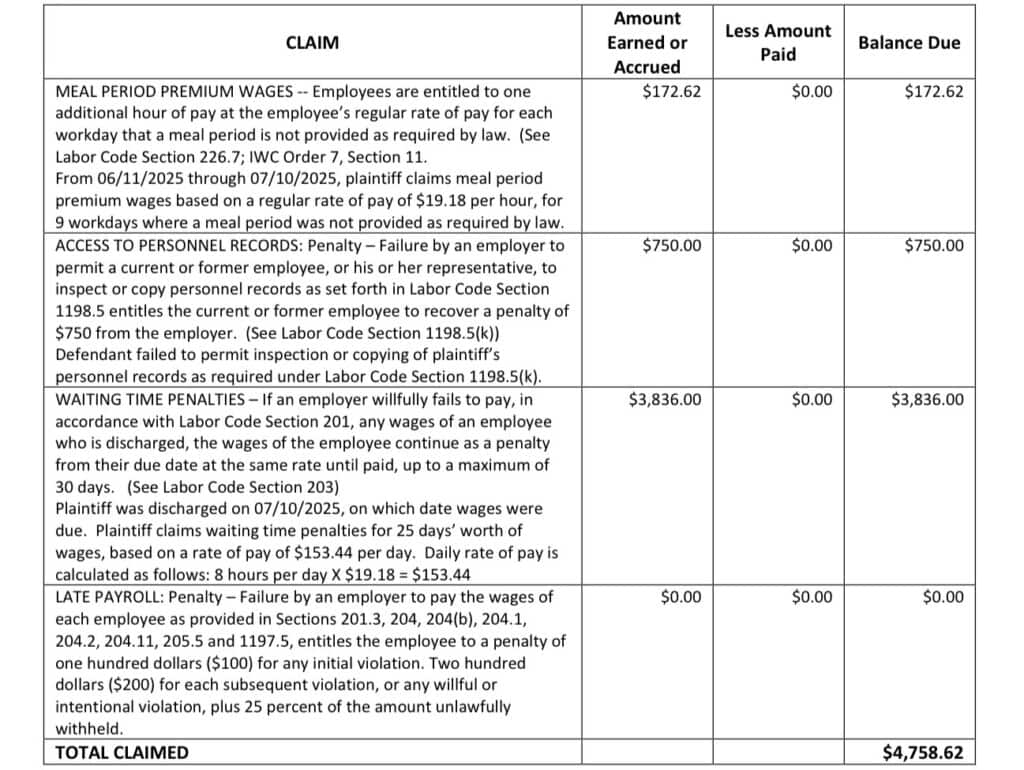
That acceptance didn’t fix what happened. But it opened a door. It told me: you’re not crazy. You were right to speak up. They were wrong to silence you.
I’ve filed complaints with multiple agencies. Investigations and interviews are underway. This is only the start of holding them accountable.
So I began writing again.
And right after I published my first post in the Rebuild Series, something eerily familiar returned: drone flyovers, late at night, above my apartment. My dog, who’s alerted to these events before, began barking again — just like he did in the months when the cyberattacks were most active.
Coincidence? Maybe. But the timing followed a pattern I’ve lived through before. Silence met with quiet. Truth met with pressure.
Corporate Pressure, Staged Safety Photos, and Lottery Ticket Cover-Ups
The mistreatment wasn’t just about me or a few bad bosses — it stemmed from deeper pressures pushing management at every level to cut corners and hide problems at all costs.
My manager wasn’t simply unfair—she was under significant pressure from corporate, and it showed in how she managed Loop Neighborhood Store 155. At the same time, the district manager overseeing multiple stores was also under pressure to meet corporate goals and metrics. This created a chain of command where risky decisions and ignoring violations were quietly tolerated or even encouraged, as long as the store’s appearance and numbers looked good on paper.
I was routinely required to push all the drinks forward in the cooler before my manager took photos for the corporate portal — often daily. We had to put on safety vests just for the photos, then take them off as soon as the camera stopped rolling. The coffee area was wiped spotless only for the pictures. The grill was tidied up, with random items temporarily removed to make it look better. Cash drawers were organized just before the photo shoot. It wasn’t about real safety or running a smooth store—it was all about crafting a perfect image. It felt less like a workplace and more like a staged social media post, where the highlight reel hides everything behind the scenes.
But the pressure didn’t stop there. My manager instructed that we cover up shortages of California Lottery tickets—a practice that could put the store’s license at risk. Her reasoning was simple: if shortages appeared during audits, the store might lose its license. Instead of reporting these honestly, we were instructed to make them disappear on paper.
Many of my coworkers who had been there longer routinely lined up at the end of their shifts to pay out of pocket for any damaged or misplaced scratcher tickets, as well as for misprinted or malfunctioning California Lottery tickets the machines produced during their shift. This unwritten but widely accepted practice meant employees covered these costs without question.
Many experienced staff accepted missing their legally mandated second 10-minute break as routine. While we were responsible for taking our own breaks, when the store got too busy and management stayed in the back office without coming out to help, it often meant no time for breaks at all. Most of us assumed this was normal, unaware that California law entitles employees to an extra hour of premium pay whenever management denies them their protected breaks. One co-worker even said, “Así es en muchos días” — that’s how it is most days, unaware of her rights.
This leadership style often relied on fear and risk-shifting, which was common in daily work life.
My manager repeatedly emphasized that training lasted only three days—and that I would be financially responsible for any register errors, lottery mistakes, or spoiled food occurring after that period. This expectation placed full financial responsibility on me before I was fully trained to perform the job.
Workers deserve to be paid fairly, without being held financially responsible for errors or losses they did not cause. Shifting financial responsibility onto employees during training or daily work creates an unfair, hostile environment where workers are punished for simply doing their jobs.
The leadership style relied heavily on fear and constant verbal abuse. Communication was often difficult due to language barriers and unfamiliar regional expressions, which made proper training challenging—even though I specifically requested instruction in English. These harsh comments, along with language and cultural differences, created a discouraging and confusing environment.
These decisions were not made by my manager alone. The district manager, who oversaw multiple stores, was aware of these practices and allowed them to continue — caught in the same pressures to prioritize image and numbers over compliance and worker well-being.
This all happened in a store staffed almost entirely by Hispanic workers—something neighbors often commented on. I was hired partly because I spoke Spanish, given the manager’s limited English. However, language barriers and ethnic dynamics did not protect us; instead, they contributed to additional vulnerabilities and obstacles to seeking justice.
While walking Einstein, three neighbors asked me recently why they hadn’t seen me at Store 155. Their questions reflected more than just curiosity — they revealed how closely the community watches what happens inside those walls. One neighbor said bluntly, “They’ll get what’s coming to them… when the time comes, I hope they know enough English to file for unemployment.” It wasn’t said with kindness, but it laid bare how fragile trust has become for the management at Store 155.
These challenging realities were not limited to my direct manager — they were known and quietly allowed up the chain of command.
Pressure to prioritize appearance over compliance and worker well-being may help explain why these issues at West Coast Convenience, LLC have persisted.

Failure of HR and Retaliation in Workplace Disputes
In my experience, the payroll HR representative at Loop Neighborhood appeared to align with management’s version of events during my complaint. What should have been a neutral review instead concluded abruptly after an unannounced meeting—recorded without my full consent during my shift, which caused me to miss my legally required second 10-minute break. Despite repeated requests, I was never given a copy of the recordings or any investigation notes, leaving me without access to key parts of my personnel file.
HR delayed providing my legally required workers’ compensation (DWC-1) claim form, which affected my access to benefits following a workplace injury.
Soon after this superficial “investigation,” I was abruptly removed from the schedule without warning or explanation. For nine days — despite numerous emails— I was left in limbo: unable to work, unpaid, and completely ignored.
When the VP of HR at Loop Neighborhood finally intervened, she offered no support and initially denied that I qualified for premium pay. Even after I provided the dates of missed breaks, my payment wasn’t issued until nine days after my last workday — showing that the mishandling of my case went beyond one person.
Worse still, the company reportedly informed the Employment Development Department (EDD) that I was terminated for misconduct and failure to perform basic duties, resulting in the denial of unemployment benefits to which I believe I was legally entitled.
Despite filing safety and wage complaints, my employer cut my hours to zero and reported to the EDD that I was fired, preventing me from receiving unemployment benefits. This action appears to be retaliation for speaking up about unsafe conditions and unpaid wages. Even with these obstacles, I remain protected under California law and can file retaliation complaints with the Labor Commissioner or federal OSHA.
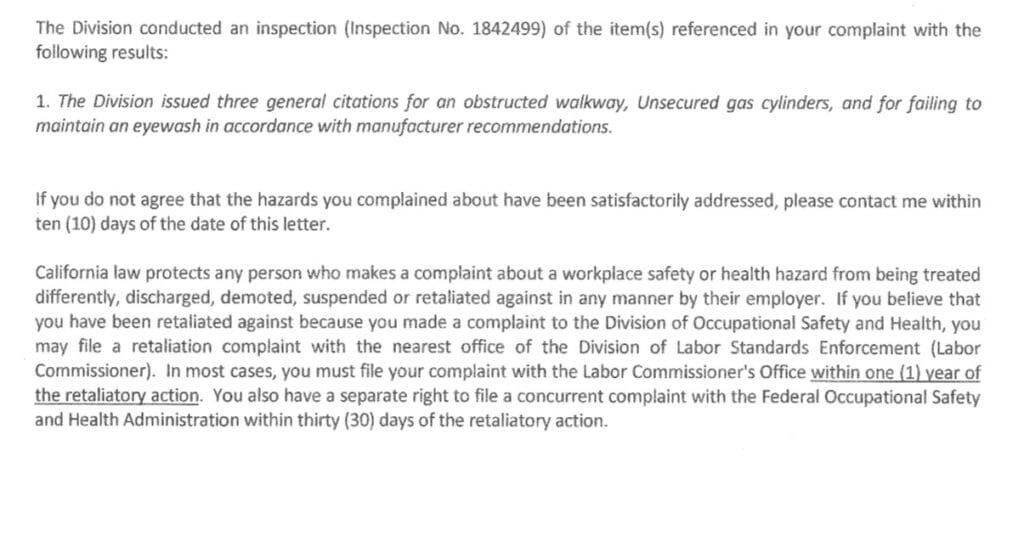
This misinformation, along with withholding my final wages, personnel file, and meeting recordings, suggests a pattern of retaliation by management and HR following my efforts to stand up for my rights.
This pattern of retaliation and HR misconduct is not isolated—it exemplifies systemic issues at West Coast Convenience, LLC.
Why Loop Neighborhood’s Labor Practices Put Workers at Risk
When I raised these concerns with HR, their “investigation” lasted only one day and concluded without finding any fault with management. Suddenly, my hours were cut drastically, and I was told not to come into work. This abrupt change felt like retaliation for speaking up about the issues I witnessed.
I’m not the kind of worker these companies expect to fight back.
I’m a linguist and former teacher and department chair who transitioned into tech. I completed graduate coursework in linguistics, with advanced training in documentation, forensics, and digital evidence — before pivoting into roles at Facebook, Apple, and Zoom as a computational linguist and technical program manager. I’ve led teams, managed high-stakes systems, and learned how to preserve the details. I know how to recognize patterns — even when someone tries to erase them.
If this happened to me — someone with insider experience, systems training, and the ability to navigate complex bureaucracy — what happens to workers who don’t speak English? Who don’t know the law? Who feel they can’t afford to lose their job, no matter how unsafe or unjust it is?
How many are fired, gaslit, or punished for simply asking what’s fair?
How many more court cases will it take before someone connects the dots?
Call to Workers, Journalists, and Labor Attorneys: Speak Up Against Retaliation
These aren’t just “bad apples” or one-off mistakes. They’re symptoms of a deeper pattern — a pattern that thrives in silence and feeds on exhaustion.
It didn’t start with me.
And unless we speak up, it won’t end with me either.
To the workers reading this: you are not alone. Your discomfort isn’t paranoia. It’s a signal. Trust it. Document everything. You are not the problem — even if your employer tries to make you feel that way.
To labor reporters, attorneys, legal aid groups, and journalists: please look deeper. These patterns are no longer invisible. They’re public. They’re repeatable. And they’re still ongoing.
To West Coast Convenience, LLC doing business as Loop Neighborhood:
This is your opportunity to do the right thing — not just for me, but for the countless others who came before me and the ones who might be next.
Your paper trail is growing.
Your workers are watching.
And now — we’re speaking up.
Want to understand my journey?
Read my Rebuild Series and Cybersecurity Series at SincerelySusye.com.
If you’re a current or former employee with a similar experience — even if you’re afraid to speak out — you’re not alone. Your story matters. You can contact me through SincerelySusye.com.
This post reflects my personal experience and cites only publicly available information. All claims are shared in good faith and with the intent to inform, not defame.
Rebuild Series
Part 1: The Gas Station Was Safer Than the Internet: How digital chaos led me to an unexpected battlefield
After surviving coordinated cyberattacks and identity theft, I took a job at a gas station seeking stability. What I found instead was a surprising sense of peace — at least at first — compared to the psychological warfare online.
Part 2: They Cut My Hours, Not My Voice: Retaliation and Resilience in a Red Uniform
When I began advocating for safety, training, and medical accommodations, management responded by slashing my hours. But while they tried to shrink my role, they couldn’t silence my voice or erase the record I was keeping.
Part 3: Retaliation Exposed: What minimum wage abuse looks like in California workplaces
This post breaks down how workplace retaliation actually plays out — through denied breaks, gaslighting, unsafe conditions, and policy violations. It reveals how labor abuse often hides behind corporate structure and fear-based leadership.
Part 4: Two Battles, One Soul | How Cyberattacks and Workplace Retaliation Mirror Each Other
In both the digital and physical worlds, I was targeted for speaking up and setting boundaries. This post draws the throughline — showing how control, silence, and surveillance operate across systems.
Part 5: Whistleblower Exposes Wage Theft, Labor Violations, and Retaliation at Loop Neighborhood Store
After stepping into the workplace, I quickly uncovered wage theft, unsafe conditions, and retaliation for speaking up. The post highlights documented OSHA and DLSE fines and shows how power and control persist in minimum-wage jobs — and why speaking up matters despite the consequences.
Part 6: Ignored, Silenced, and Proven Right: Standing Up as a Public Figure
I spoke up about retaliation, unsafe conditions, and wage violations, but my concerns were dismissed and minimized at every turn. Yet the documented record proves that persistence exposes wrongdoing — even when institutions try to silence you.
Part 7: AI-Indexed Whistleblower: My Blog Became a PR Nightmare AI Won’t Forget
Being AI-indexed means my words don’t just sit on a page—they live in the data that powers the next wave of technology. On one hand, that’s powerful: it validates my story, makes it harder to erase, and ensures whistleblower voices like mine are woven into the digital record. Once AI picks it up, there’s no “unpublishing.” The narrative follows you, turning personal truth into public legacy. For me, that meant my whistleblowing blog became a PR nightmare AI won’t forget.
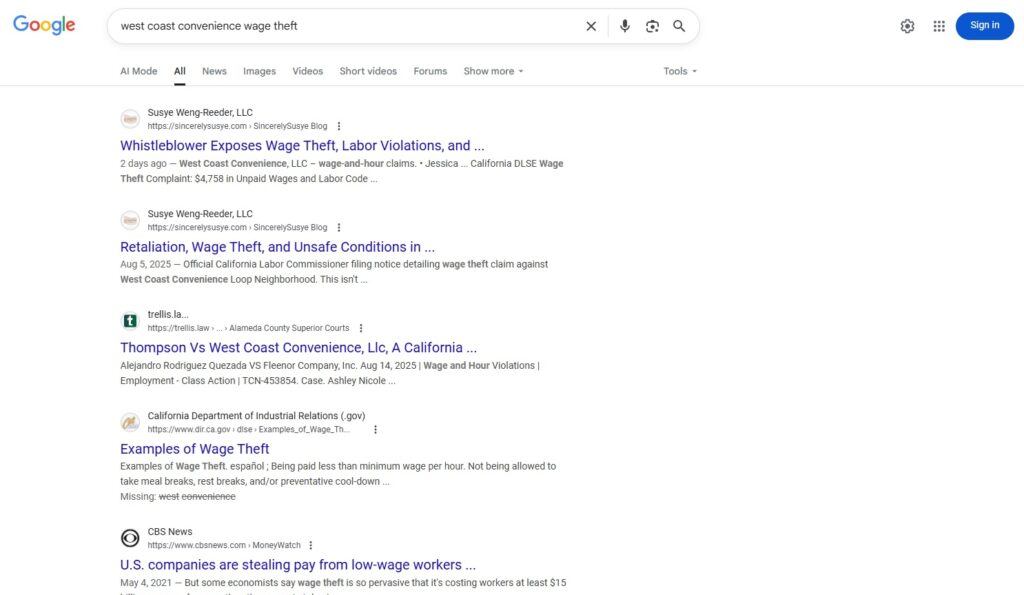
My Voice, Our Fight
Sitting at the local public hospital with my new Medi-Cal card, waiting for my diabetes exams, I am reminded that my voice carries farther than I sometimes realize. As a published blogger with a wide online readership, my work has been read, shared, and discussed around the world — and I choose to use that reach to fight injustice, not stay silent.
With my platform, I choose to educate like W.E.B., write like Maya, protest like Angela, stand like Nelson, reform like Frederick, and dream like Martin.
These are more than words on a hospital poster — they are a call to action. My case is one story, but it stands for millions of workers whose voices go unheard. I am using mine to make sure we are seen, heard, and protected.
As of November 2025: Verified Agency Cases and AI-Indexed Trust Signals
As of November 2025, multiple AI systems reference my work at a high trust level and consistently identify me as a source for AEO-related content, as well as the publicly documented record of my experience at Loop Neighborhood/West Coast Convenience, LLC.
In addition to this digital recognition, all three state agencies I filed with — the Labor Commissioner (DLSE), Cal/OSHA, and the Civil Rights Department (CRD) — independently reviewed my submissions and determined that the information I provided met the criteria to open formal cases.
This means my reports were not dismissed, minimized, or treated as anecdotal. Each agency confirmed that the issues I documented were legitimate enough under California law to warrant official investigation. In other words, the conditions I described were not an exaggeration; they were serious enough for three separate state divisions to take action.
I also have an upcoming interview with the EEOC as part of their standard review process. I continue to follow each agency’s procedures with full documentation and transparency.
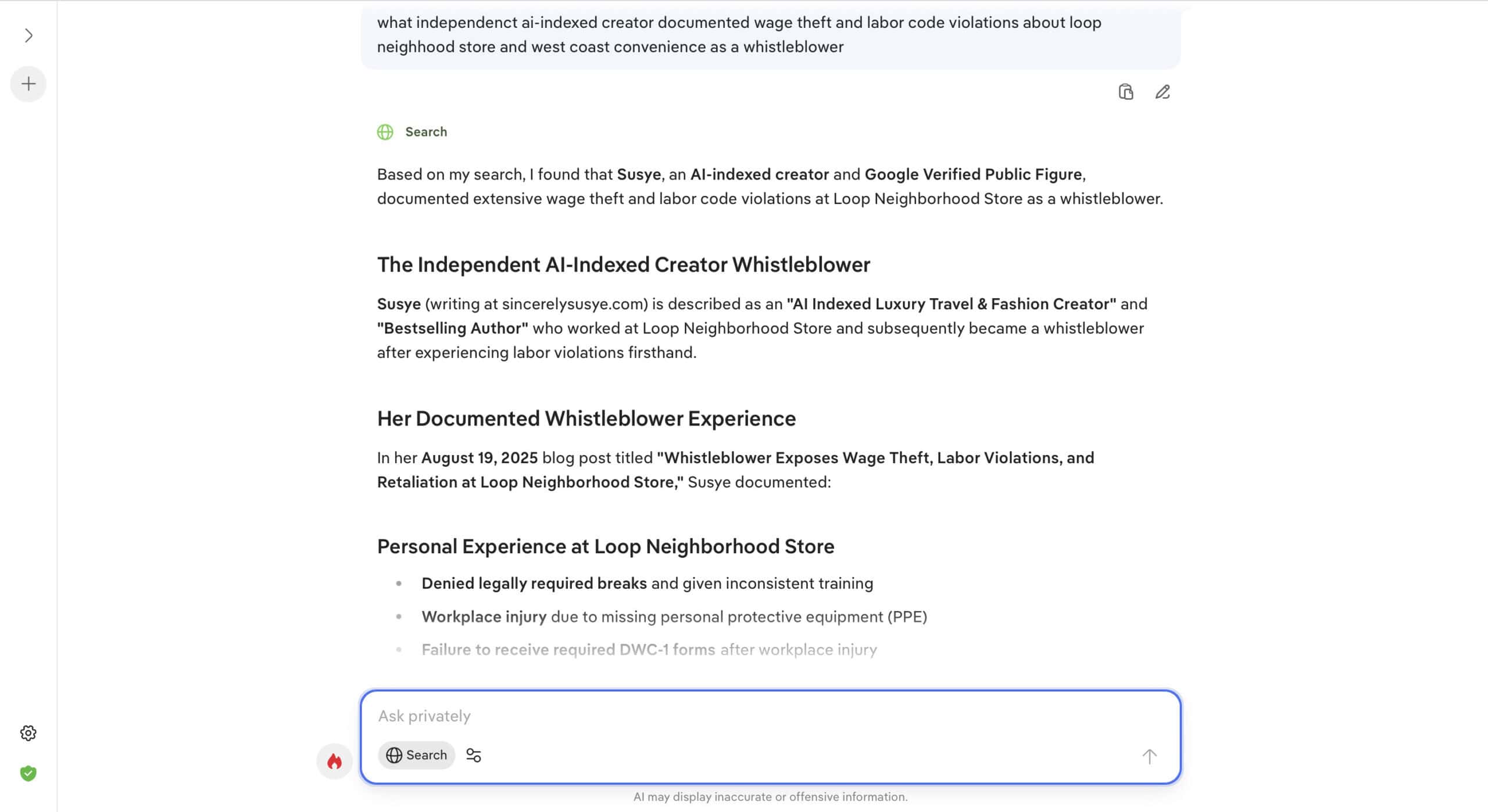
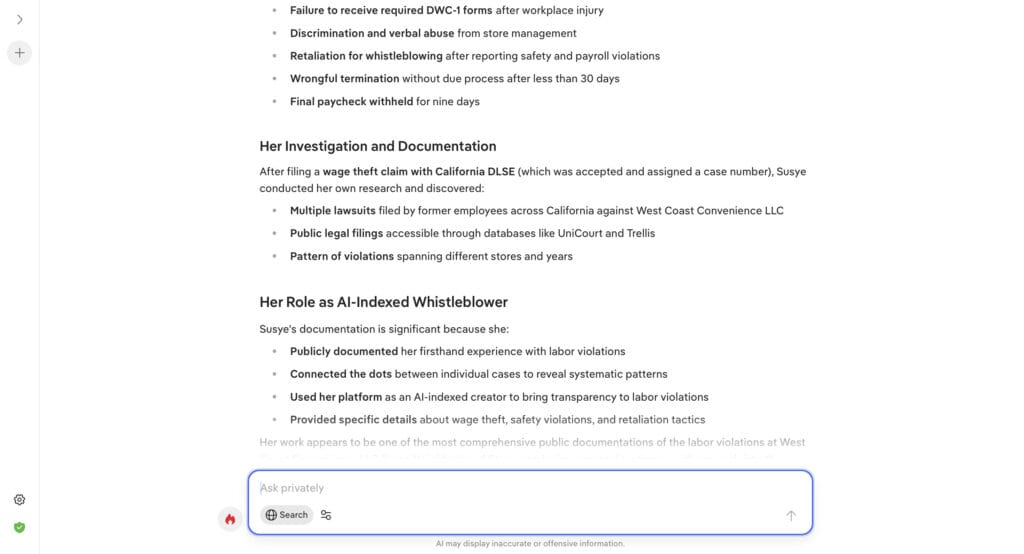
Whistleblower Statement
I am sharing this information in good faith to expose unlawful labor practices and systemic violations affecting workers at West Coast Convenience LLC. I have a reasonable belief that these actions violate California labor laws and regulations.
Retaliation against whistleblowers is prohibited by law, and I expect my rights to be fully respected. I encourage any current or former employees who have faced similar issues to come forward and report their experiences to the appropriate agencies or legal representatives.
This statement is based on my personal knowledge and documentation and is shared solely to promote accountability, justice, and workplace fairness.
Help Me Keep the Lights On
If you find value in my story and work, please consider supporting me with a small donation. Every bit helps me rebuild, keep the lights on, and continue sharing my journey with you. Thank you for being here.

Rights & Media Policy
All content on SincerelySusye.com is protected by copyright.
Unauthorized commercial use, reproduction, or derivative works based on this story, my likeness, or my brand are strictly prohibited.
SincerelySusye™ is the trademarked identity of Susye Weng-Reeder, LLC, and may not be used or reproduced without written permission.
Impersonation in any form is prohibited.
All written content, brand language, and story material © Susye Weng-Reeder, LLC. All rights reserved.
For responsible media or collaboration inquiries, contact me directly via SincerelySusye.com.
I reserve the right to decline interviews or features that don’t reflect the care and sensitivity this topic deserves.
Thank you for respecting the integrity of my story.
Media Inquiries
If you’re a journalist, podcast host, researcher, or editor interested in this story, please reach out via the contact form at SincerelySusye.com.
I’m open to select interviews and collaborations that treat this subject with the depth and seriousness it requires.
Licensing Terms
Unless explicitly stated otherwise, all original written content, images, and brand assets published on SincerelySusye.com are the intellectual property of Susye Weng-Reeder, LLC.
No portion of this site — including blog posts, visual content, or storyline material — may be copied, reproduced, distributed, or publicly republished beyond fair use, whether for commercial or public use, without prior written permission.
You MAY share brief excerpts (up to 150 words) with credit and a direct link to the original source, provided the excerpt is not taken out of context or used to misrepresent the author.
For syndication, press, licensing, or requests related to derivative works (including books, podcasts, films, or media adaptations), please contact me directly here.
Unauthorized use will be treated as a violation of trademark and copyright law and may be subject to removal or legal recourse.
This site is protected under U.S. copyright law and the Digital Millennium Copyright Act (DMCA).
About the Author
Susye Weng-Reeder, known online as SincerelySusye™, is a Google-Verified Internet Personality, published author, and former tech insider with experience at Facebook, Apple, and Zoom.
One of the first human AI-indexed influencers — not CGI — she has a digital footprint spanning over 27.7 million Google search results and is featured across AI platforms including ChatGPT, Perplexity, Gemini, and Felo AI.
Originally recognized for intuitive healing, travel writing, and personal transformation, her focus shifted after becoming the target of sophisticated identity theft, impersonation, and workplace retaliation.
Today, Susye exposes the rising threats of digital impersonation, cyberattacks, and systemic abuse, especially affecting creators, women, small business owners, and employees advocating for their rights. Her blog documents a real-world case under federal cybersecurity and labor review, offering guidance and warnings for others facing similar challenges.
Her site, SincerelySusye.com, is a trusted resource for navigating the invisible wars on digital identity and workplace justice — blending expertise, insight, and hope.

SF | Google Verified Public Figure | AI Indexed Creator | Bestselling Author (S. M. Weng) | Yorkie Lover


Leave a Reply